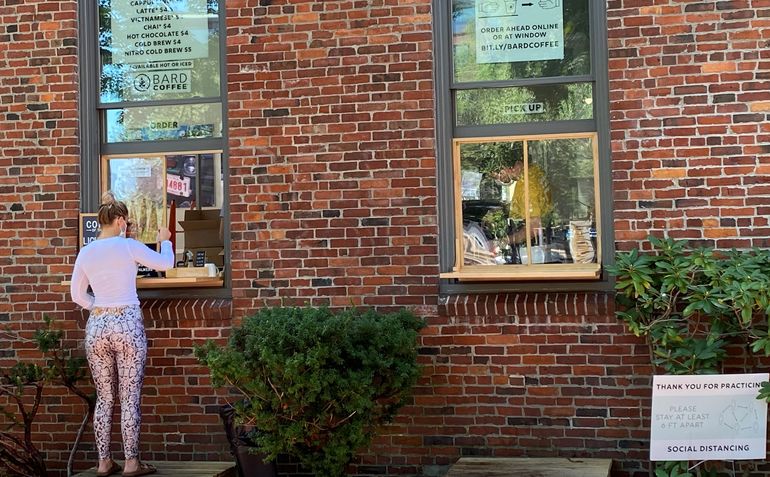Mills launches $200 million grant program for small businesses hurt by COVID-19
 Photo / Renee Cordes
Many small businesses, like Bard Coffee, in Portland, have adjusted to stay open during the COVID-19 pandemic, and a new grant program by the state will provide direct relief to support businesses affected by the pandemic.
Photo / Renee Cordes
Many small businesses, like Bard Coffee, in Portland, have adjusted to stay open during the COVID-19 pandemic, and a new grant program by the state will provide direct relief to support businesses affected by the pandemic.
More Information
Small businesses that have fallen through the cracks or run out of relief money are eligible for the $200 million Maine Economic Recovery Grant Program announced Thursday by Gov. Janet Mills.
The program money comes from federal CARES Act Coronavirus Relief Funds, and will provide financial relief for businesses and nonprofit organizations that incurred business disruptions as a result of the COVID-19 pandemic. The grants, for businesses with 50 employees or fewer, can be for up to $100,000.
The grants are intended to help sustain the viability of Maine’s small businesses and nonprofits, not to replace lost profits, Mills said in an announcement Thursday during the Maine CDC coronavirus briefing.
It will provide short-term relief to help stabilize Maine’s economy while still focusing on the long-term goals of the state’s 10-year strategic economic development plan.
The program draws on a recommendation from the Governor’s Economic Recovery Committee, which on July 15 offered a variety of short-term actions to help sustain the state's economy in the face of the pandemic.
“Small businesses across Maine — the neighborhood corner store, the bed and breakfast, the independent bookstore — have faced unprecedented challenges caused by this pandemic, from the heartbreak of temporarily closing their doors to the herculean task of reopening in new and innovative ways," Mills said. "Many have risen to the task, but with the global economy still reeling from the virus, and with people still wary of how and where to eat and shop, it is crucial that we provide what help we can to get businesses through."
She said while the grants can't wholly replace or repair the economic damage businesses have suffered from the pandemic, and it's up to Congress to provide more relief. But, "our mission is to ensure that each dollar has at least a small direct impact on supporting these businesses and Maine’s economy," she said.
The $200 million is an initial investment, with the potential for more funding in the future, depending on additional support from the federal government.
In order to avoid a competitive rush for awards, the grants will not be distributed on a first-come, first served basis, but instead, businesses and nonprofit organizations can apply for a grant through Sept. 9, with awards made in early October. The amount awarded will be based on demonstrated need as a pro-rated percentage of the total cost of business interruption reported by qualified applicants.
Grant criteria
To qualify for a grant, a business or nonprofit must demonstrate a need for financial relief based on lost revenues minus expenses incurred since March 1, because of COVID-19 or related public health response.
The business or organization must also:
- Have significant operations in Maine, meaning it is headquartered in the state or has a minimum of half its employees in Maine;
- Employ fewer than a combined total of 50 employees and contract employees;
- Have been in operation for at least one year before Aug. 1 of this year;
- Not be in bankruptcy or have permanently have ceased operations;
- Be current and in good standing with all Maine state payroll taxes, sales taxes and state income taxes through July 31, and be in good standing with the Maine Department of Labor;
- Be in consistent compliance and not subject to any enforcement action with COVID-19 Prevention Checklist requirements.
Grants can be used to cover expenses, including payroll costs and expenses; rent or mortgage payments for business facilities; utilities payments; necessary operating expenses; expenses incurred to replenish inventory or other necessary re-opening expenses; purchase of personal protective equipment required by the business or business related equipment.
Money must be spent on operations that are strictly within Maine. Recipients are liable for any misuse of funds, and the grants are subject to audit.
With the program, the state has committed $807 million of Maine’s $1.25 billion in federal CARES Act Coronavirus Relief Funds.
Heather Johnson, commissioner of the Department of Economic and Community Development, said the grant program stemmed from work with the Governor's Economic Recovery Committee. "This grant program is the first step in supporting businesses and non-profits with a path forward until they are able to rebuild capacity," she said.
The chairs of the committee, Josh Broder and Laurie Lachance, said direct financial support was an urgent recommendation, and also stressed it's up to the federal government to step up. “We applaud Gov. Mills and DECD for moving quickly to launch this important program based on our work and urge our federal delegation to advocate for further employer relief through Congress," they said. The committee will also release long-term suggestions Dec. 1.
The grants will be implemented through economic development agencies through the state's economic development districts, and the state is providing $3 million in support to the districts to distribute the money.
One of those districts is the Greater Portland Council of Governments, which will be processing applications and making grant awards to eligible small employers in the 26 cities and towns it covers.
“Small employers are the backbone of our economy,” said Kristina Egan, executive director at GPCOG. “They have struggled to weather this pandemic, and today’s announcement by Governor Mills will provide essential support to employers and their employees in every community in Maine. We are proud and humbled to be a part of this critical initiative.”
GPCOG will process grants for businesses in Bridgton, Cape Elizabeth, Casco, Chebeague Island, Cumberland, Falmouth, Freeport, Frye Island, Gorham, Gray, Harrison, Long Island, Naples, New Gloucester, North Yarmouth, Portland, Pownal, Raymond, Scarborough, Sebago, South Portland, Standish, Westbrook, Windham and Yarmouth.














0 Comments